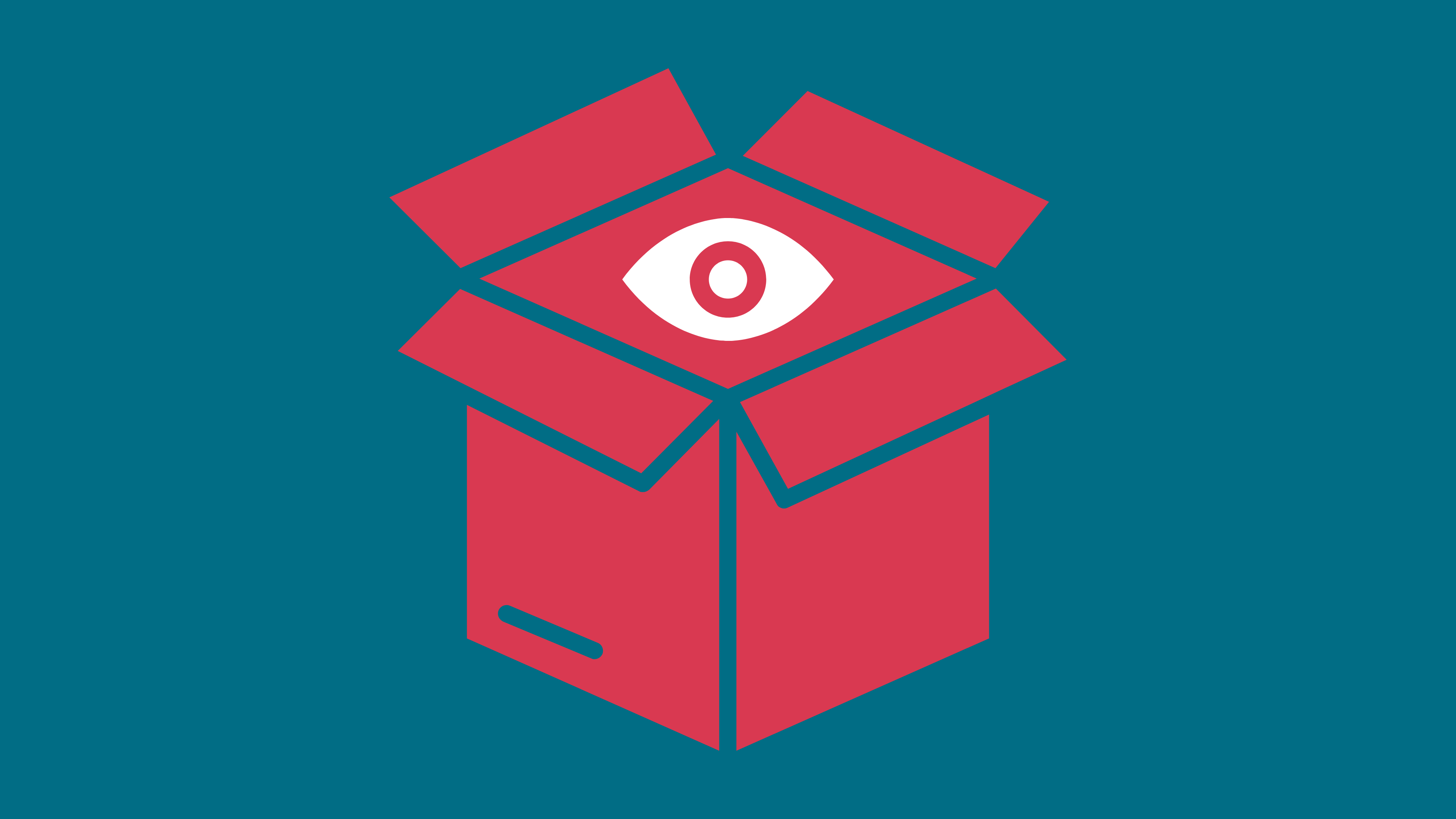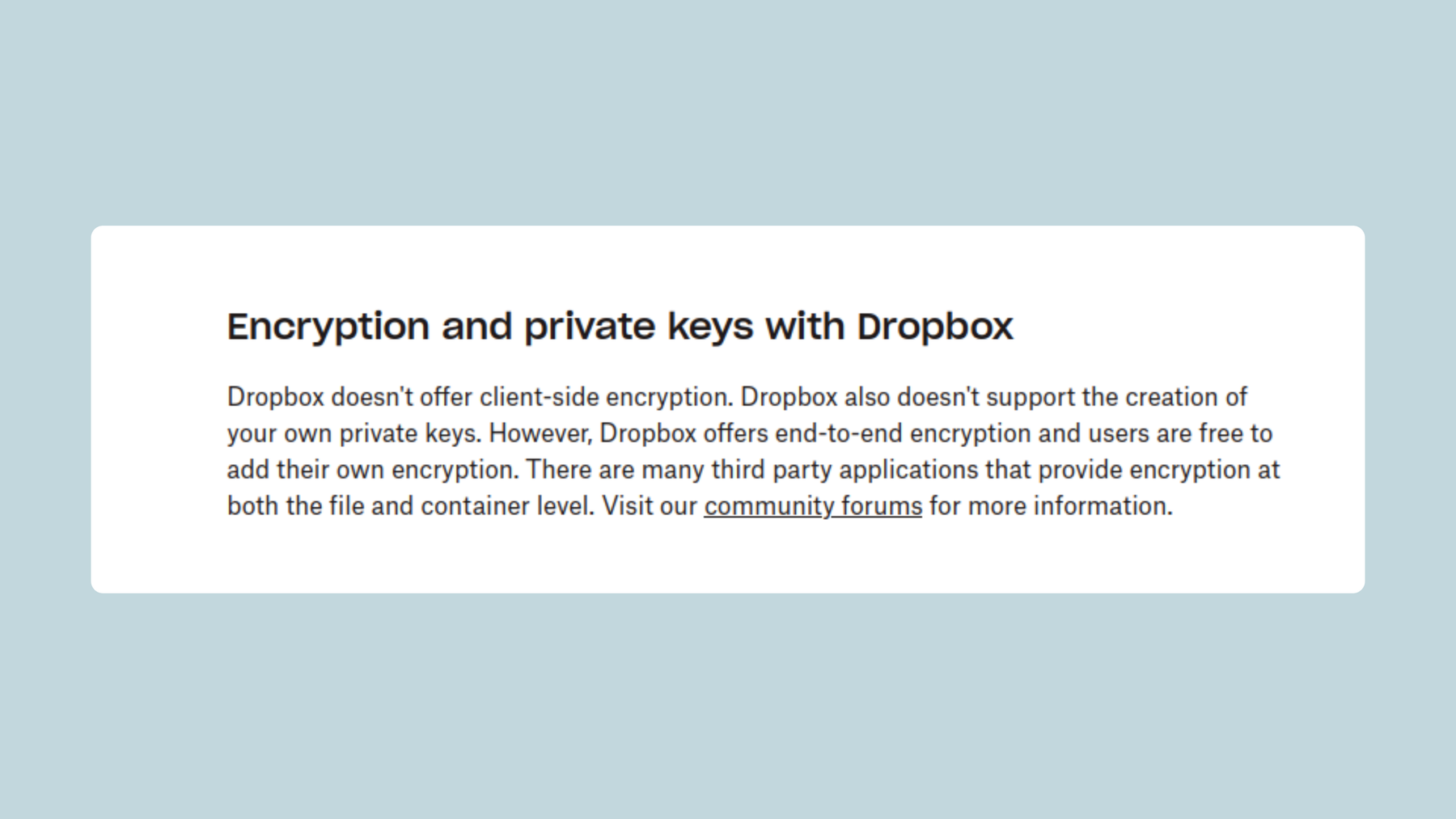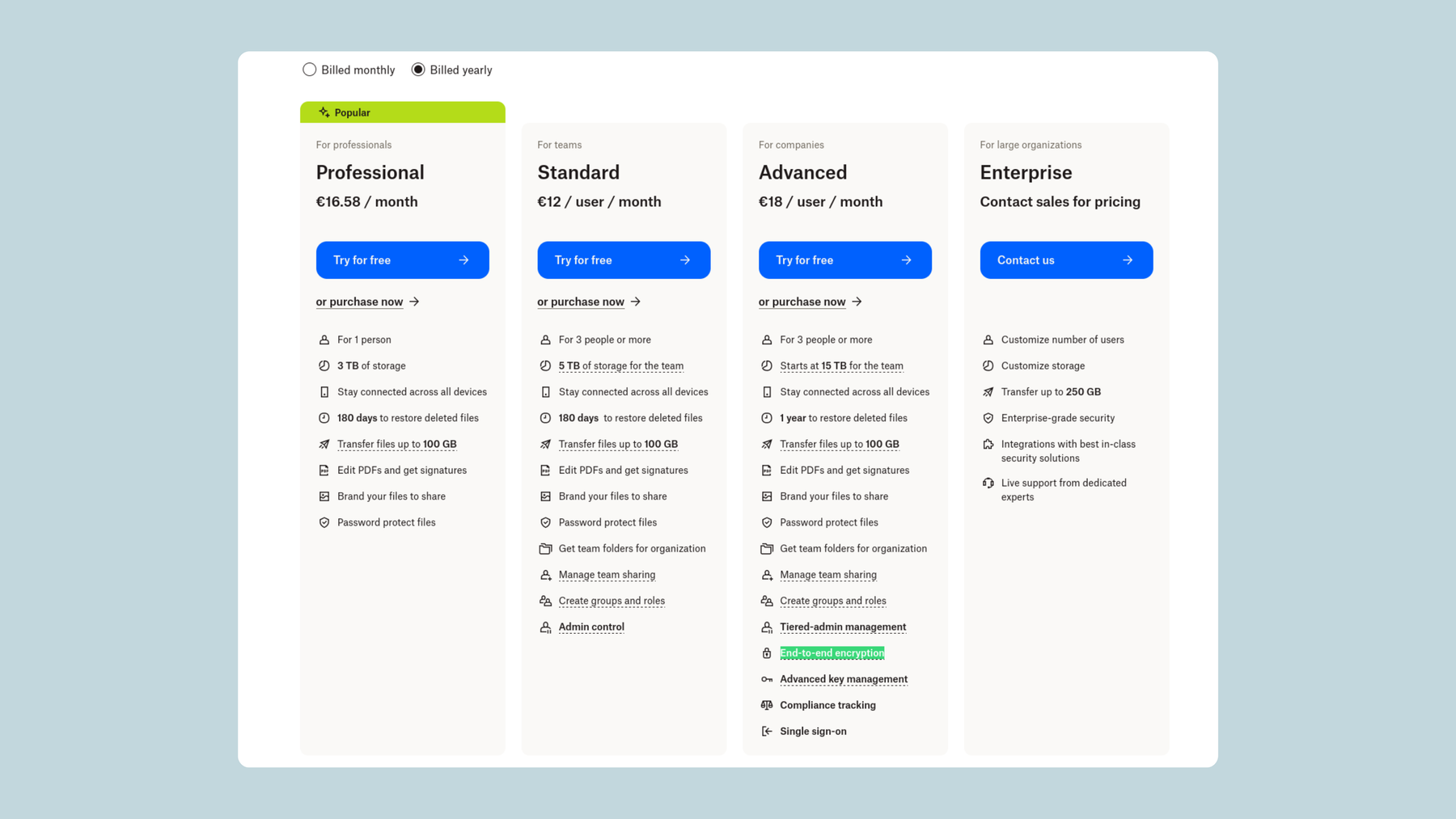Is Dropbox secure to use for confidential documents in 2026
Dropbox is a popular cloud storage provider used by millions, but this doesn’t mean it’s the safest or best cloud storage for good privacy. Today we take a look at how safe Dropbox is and if it should be trusted for storing confidential and sensitive information.
How safe is Dropbox? Key points to consider
-
Dropbox has suffered a number of security issues, including a breach in 2012 were 68 million passwords were compromised.
-
It does not offer end-to-end encryption by default.
-
Dropbox can access your stored data because there’s no E2E encryption.
-
Dropbox is not open source.
-
It is based in the US, a five eyes country with weaker data protection laws compared to the EU.
Released in 2008, Dropbox quickly became a popular cloud storage name, with 700 million registered users in 2021. Although popular, the file hosting service has suffered data breaches and security incidents over the years so it’s no surprise people question if Dropbox is safe and secure to use - especially for confidential data.
Dropbox does have solid security measures in place to protect your data from external threat, but it doesn’t offer the best privacy and protection against internal prying or hacking attacks. Because your files are not protected with end-to-end encryption, the US-based company can access and view what you keep stored in its cloud. So while, Dropbox might invest strongly into protecting your data from external attacks, it doesn’t mean it’s safe from inside snooping or from malicious hackers that get access to the Dropbox servers.
Keep reading as we go more into detail about it’s security and privacy features.
The number one consideration: end-to-end encryption
When looking for a secure cloud storage provider, like email – one shoe doesn’t fit all. There are many factors you should consider when choosing the perfect cloud provider, the most important for us at Tuta is security and privacy.
When speaking about data security, it refers to how well your data is protected. If the provider doesn’t protect your personal data from external and internal exploits, just how secure is it? Data security is put in use when your files are transported from your personal device to the cloud, and when they’re stored on a cloud server. Privacy, just as important as security, refers to who has access to your private information and if there’s access, how your provider uses your personal data.
The benchmark or gold standard we could say for cloud storage is one that has zero-knowledge encryption, also referred to as end-to-end encryption. With end-to-end encryption, only the user has access to their account and their private information. With proper encryption you’re guaranteed that you, and only you, have access to your account and data – thus both the privacy and security boxes are checked.
Unfortunately Dropbox and Google Drive do not offer end-to-end encryption by default.
A look at Dropbox’s security
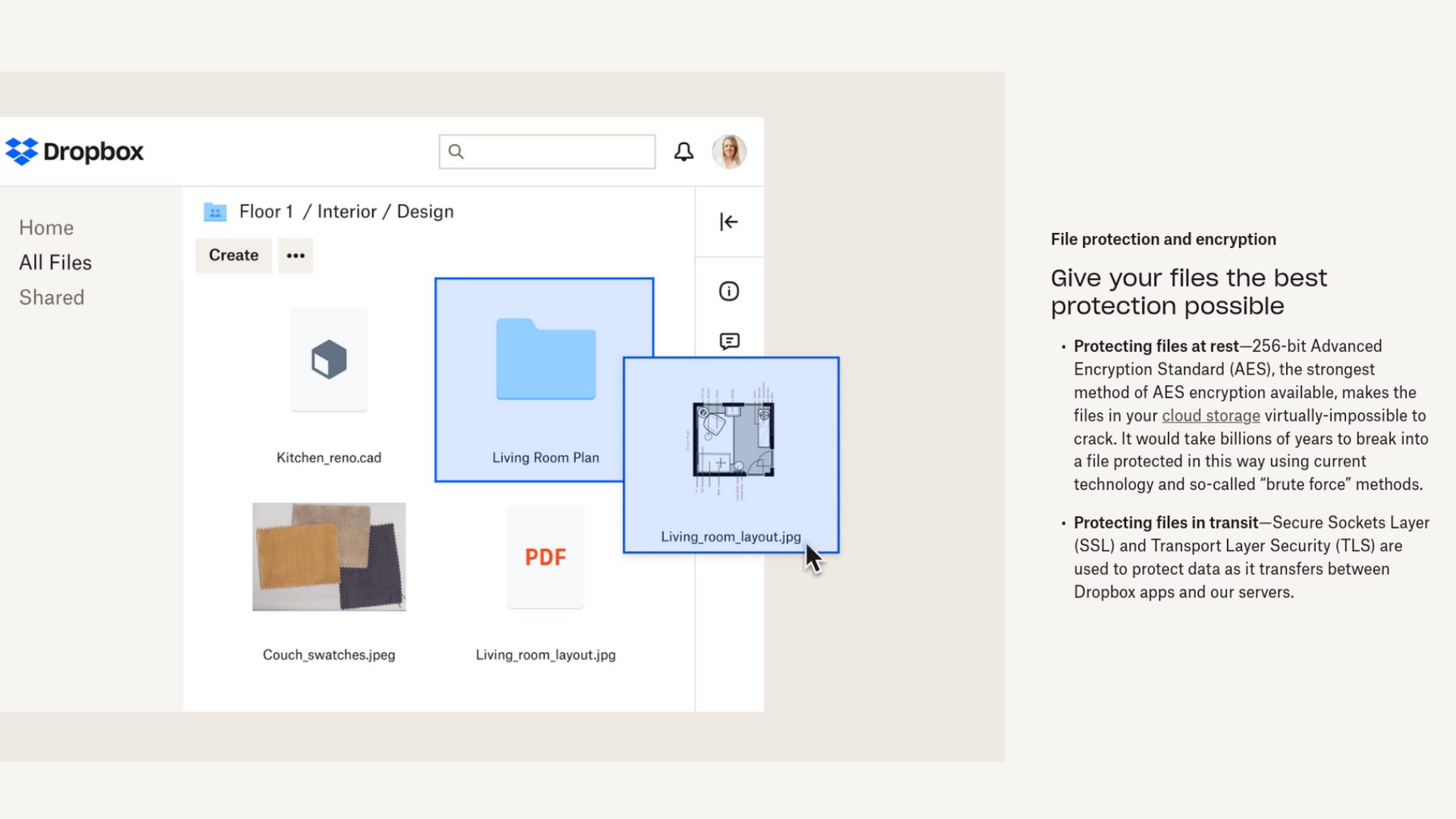

By default Dropbox uses SSL/TLS encryption while your files are in transit and AES-256 bit encryption while your files at at rest in their server. Screenshot: Dropbox.
In terms of security, Dropbox adheres to good protocols while your files are in transit from your device to their servers, as well as when your files are stored on their servers. As mentioned on their website, when your files are in transit, Dropbox uses Secure Sockets Layer (SSL)/Transport Layer Security (TLS) encryption - a standard encryption protocol used by most online services these days. TLS/SSL protects your data as it transits between device and server – without such encryption your data would be vulnerable to external attacks and available to everyone to read just as if you were sending a postcard.
If you use Dropbox, your files are encrypted while in transit, decrypted on arrival, and encrypted once again, but this time with 256-bit Advanced Encryption Standard (AES). When your data is stored at rest on the Dropbox servers it’s protected by AES-256 bit encryption which is also used by militaries and governments globally.
But the problem with Dropbox’s encryption implementation is that it has access to the key that is securing your data. Thus, the US-based company has full access to all your data as it can easily decrypt it.
Dropbox offers no end-to-end encryption by default. For businesses Dropbox offers end-to-end encryption as an optional feature in its Advanced plan, and individuals have the option to add their own encryption. Screenshots: Dropbox.
While Dropbox does use standard encryption protocols, it doesn’t offer end-to-end encryption which means your files and private information is accessible without you even knowing. As mentioned, Dropbox is relatively secure on a broader level but is does not use the best security possible: end-to-end encryption.
Additional security features
Dropbox supports 2FA
Dropbox does support two-factor authentication, which adds a layer of protection to your login. Like with many online accounts these days, you can add this extra protection by using a security key or a code during login in addition to your login credentials. 2FA is recommended to keep your accounts safe from external attacks, especially if your credentials are leaked or when you are using a weak password that is too short.
Advanced file sharing controls
Dropbox has extra security in place for sharing files. The cloud provider offers password protect, expiration dates, and it also allows you to easily revocate files and folders.
Security against data breaches
Dropbox also protects your data from external threats through vulnerability testing, dark web monitoring as well as offering enterprise detection and response capabilities.
What about Dropbox’s privacy concerns?
Cloud storage should be a place to privately store your important files and documents. For many, the cloud is the perfect way to back up important information like tax documents, pictures, and financial documents that you don’t want to loose when your clunky hard drive breaks. For companies that have tons of records, the cloud is the ideal place to store this confidential information – but for enterprises it should only be an option if the records remain confidential and private through zero-knowledge end-to-end encryption - which we now know Dropbox doesn’t offer by default.
What does Dropbox do with user data?
In their privacy policy, Dropbox makes it quite clear that they process your personal data, collect and track your usage, your device and IP address, and may share your personal information with “trusted” third parties like Amazon, Google, OpenAI as well as other Dropbox owned companies. In addition to collecting a lot of information about you, they can also share this with law enforcement and other third parties.
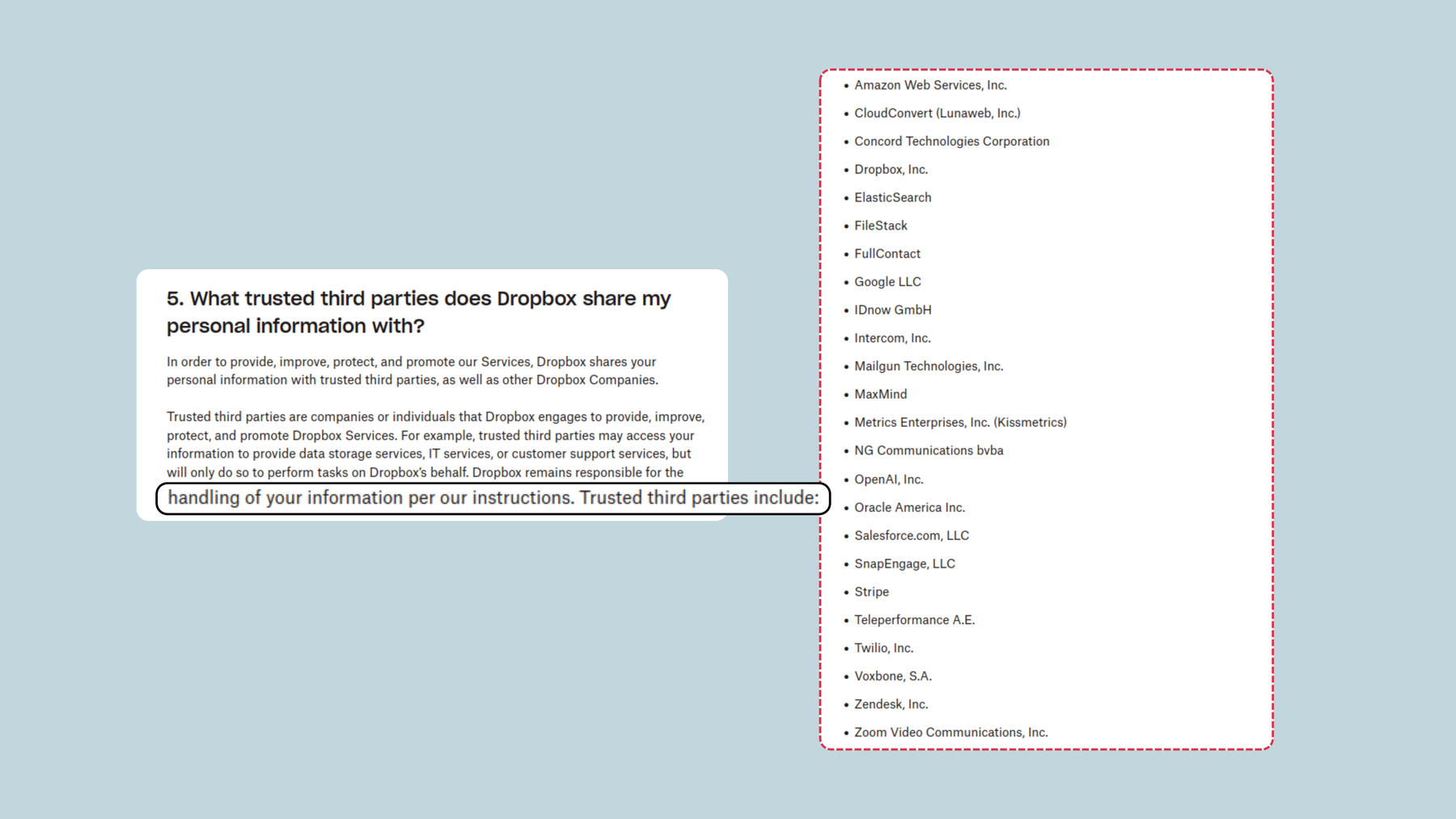

It’s written in the fine print: Dropbox shares your personal information with a long list of third parties. Screenshot: Dropbox.
Dropbox Jurisdiction
Another factor to consider is Dropbox’s jurisdiction. Its headquarter is based in the US and the majority of its servers reside there too. Dropbox does have additional servers in the UK, in the EU, in Japan and Australia but unfortunately users don’t get a choice of where they’d like their data to get stored. Storing ones data in the US is not recommended as we all know the non-existing privacy protection laws in the US which make authorities’ access to the data all to easy.
At the end of the day, it comes down to one lesson
Unless you use third-party tools to end-to-end encrypt your data on, your data is not private in Dropbox. Additionally it’s evident that the US-based company gathers massive amounts of user information and data that it possibly shares with its “trusted” partners like Google – whose business model is based on posting targeted advertisements. What’s more is the Dropbox code isn’t open source and doesn’t adhere to top privacy and security standards – there’s no end-to-end encryption by default. So no, Dropbox isn’t the most secure option out there and it is not the safest storage solution to use for confidential information in 2026.
Secure Dropbox Alternative is coming soon
At Tuta, we offer the most secure email, calendar, and contacts and soon we will be launching the much awaited Tuta Drive - a quantum encrypted cloud storage platform. With Tuta Drive, you will be able to upload, store, and share your confidential and private documents guaranteed they are end-to-end encrypted by default.
Like Tuta Mail and Tuta Calendar, Tuta Drive is easy to use, intuitive, and private by default. While Dropbox offers complex workarounds to encrypt your private documents, by simply using Tuta Drive, you’re guaranteed zero snooping, zero ads, and zero data collection.

